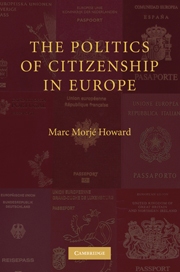Book contents
- Frontmatter
- Contents
- List of Figures
- List of Tables
- Preface
- Introduction
- PART I ARGUMENT
- 1 Citizenship in Cross-National Perspective
- 2 Historical Variation and Legacies
- 3 Continuity and Change in the Contemporary Period
- PART II CASES
- Conclusion
- Appendix I Detailed Breakdown of the Three CPI Components
- Appendix II Naturalization Rates for the EU-15
- References
- Index
3 - Continuity and Change in the Contemporary Period
The Impact of Public Mobilization
Published online by Cambridge University Press: 05 June 2012
- Frontmatter
- Contents
- List of Figures
- List of Tables
- Preface
- Introduction
- PART I ARGUMENT
- 1 Citizenship in Cross-National Perspective
- 2 Historical Variation and Legacies
- 3 Continuity and Change in the Contemporary Period
- PART II CASES
- Conclusion
- Appendix I Detailed Breakdown of the Three CPI Components
- Appendix II Naturalization Rates for the EU-15
- References
- Index
Summary
INTRODUCTION
Having addressed the causes of historical variation in the citizenship policies of the EU-15, the rest of the book explores the question of continuity and change over the past several decades. And whereas the chapters in Part II of the book examine individual cases in considerable detail, the purpose of this chapter – the final chapter of Part I – is to evaluate competing theoretical arguments that could conceivably account for why certain countries have liberalized their citizenship policies, whereas others have not. In doing so, I focus on the eleven countries within the EU-15 whose citizenship policies in the 1980s put them in either the “restrictive” or “medium” categories, as introduced in Chapter 1. In other words, the “historically liberal” countries of Belgium, France, Ireland, and the United Kingdom are excluded from the analysis in this chapter, for the very simple reason that since their citizenship policies were already liberal, the question of liberalization does not apply to them in the same way.
The analytic question at the heart of this chapter is to explain why six of the eleven relevant countries (Finland, Germany, Luxembourg, the Netherlands, Portugal, and Sweden) liberalized their citizenship policies, whereas five of them (Austria, Denmark, Greece, Italy, and Spain) did not. To address the question, I develop my main argument, which emphasizes the politics of citizenship.
- Type
- Chapter
- Information
- The Politics of Citizenship in Europe , pp. 52 - 70Publisher: Cambridge University PressPrint publication year: 2009



